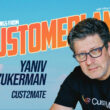Consumer behavior has been truly disrupted by a pandemic that has forced the world out of many long held-routines and established ways of doing things, and so too therefore, have buying cycles and marketing funnels.
By Michael Fisher, Ed.D
It’s highly unlikely that things will snap back to the way they were, and that means that businesses are entering an intense period of reassessment of consumer behavior, needs and purchasing journeys. That requires data. How that data is obtained is critically important.
The martech landscape in recent years has seen vendors moving beyond their initial propositions, building or acquiring Customer Data Platforms (CDP). There has been clear recognition of just how important actionable, accurate and compliant consumer data is and will continue to be.
However, while many martech vendors are playing catch-up, it’s right now that organizations need to understand evolving consumer behavior. To get the most accurate picture, they must also reassess how they obtain the data that drives the understanding. For example, is it scraped or is it earned? Are people volunteering information or are business making assumptions?
Capturing insightful data requires experience platforms that are integrated with journey orchestration, real time customer profiling and so on. Whilst martech vendors are adding in CDPs, they haven’t yet got the capability in place to create digital experiences that earn data directly from the consumers they are interacting with.
Observing broad macro trends is one thing but understanding how those trends manifest themselves in different industries and for specific businesses is another and so important.
Take these 3 examples …
- The tendency to use online sources to inform purchase decisions has transformed the sales and marketing funnel in modern times, but during the lockdown things have moved even further. People may have shifted online through necessity, but they’re less likely to buy immediately in times of such uncertainty (due to various constraints including decrease in income), according to McKinsey research. They are, however, spending more time consuming digital content. This has real implications for marketing funnels at all levels. Properly understanding how and why specific audiences are engaging with content is absolutely key.
- In uncertain times, people look to reliable and trustworthy suppliers. And that often means being able to ‘reach’ those suppliers. Agents that can help carry people through the funnel are key differentiators right now. Consumer expectations and support have come into particular focus in the nurturing phase of marketing efforts, but to what degree? What support do consumers need? How can an effective balance be struck between resource and requirement? It all depends on the industry, business and most importantly, understanding consumers and prospects themselves.
- Whereas physical events have long been a big part of initial awareness raising, they have all but disappeared for the time being. In their place has been a boom in digital events. Webinar ads have increased by 36% in recent times according to Media Radar. How businesses are promoting events, the information they’re gathering and the value exchange they’re offering attendees are all now at the forefront of a lot of ‘top of the funnel’ marketing efforts. Again, it’s a broad trend that needs to be properly explored by businesses to know what truly works (and what does not).
The impact of the pandemic is being felt all over the world – it’s a simultaneous, highly disruptive event in history. It has impacted many things in our day to day lives, and businesses not only need to reassess consumer behaviors, but the very ways they gain and understand those behaviors.
As more people rely on online services, there will be a lot of data on offer, but not all data is created equal. Relationships need to be built and genuine value exchanges need to be established to get the most useful insight. Organizations must truly earn their data.
 Michael Fisher, Ed.D. is a board member at TheCustomer and at 3radical.
Michael Fisher, Ed.D. is a board member at TheCustomer and at 3radical.
Photo by Martin Adams on Unsplash












1 comment